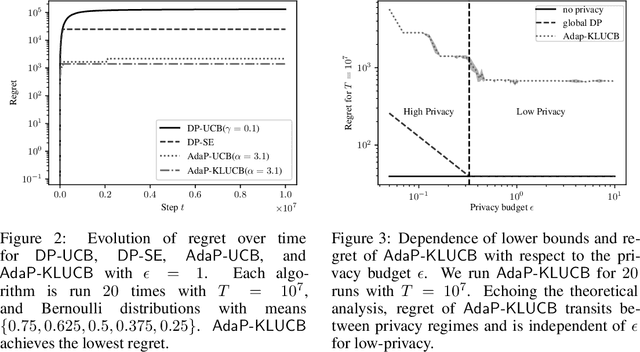When Privacy Meets Partial Information: A Refined Analysis of Differentially Private Bandits
Paper and Code
Sep 06, 2022



We study the problem of multi-armed bandits with $\epsilon$-global Differential Privacy (DP). First, we prove the minimax and problem-dependent regret lower bounds for stochastic and linear bandits that quantify the hardness of bandits with $\epsilon$-global DP. These bounds suggest the existence of two hardness regimes depending on the privacy budget $\epsilon$. In the high-privacy regime (small $\epsilon$), the hardness depends on a coupled effect of privacy and partial information about the reward distributions. In the low-privacy regime (large $\epsilon$), bandits with $\epsilon$-global DP are not harder than the bandits without privacy. For stochastic bandits, we further propose a generic framework to design a near-optimal $\epsilon$ global DP extension of an index-based optimistic bandit algorithm. The framework consists of three ingredients: the Laplace mechanism, arm-dependent adaptive episodes, and usage of only the rewards collected in the last episode for computing private statistics. Specifically, we instantiate $\epsilon$-global DP extensions of UCB and KL-UCB algorithms, namely AdaP-UCB and AdaP-KLUCB. AdaP-KLUCB is the first algorithm that both satisfies $\epsilon$-global DP and yields a regret upper bound that matches the problem-dependent lower bound up to multiplicative constants.
 Add to Chrome
Add to Chrome Add to Firefox
Add to Firefox Add to Edge
Add to Edge